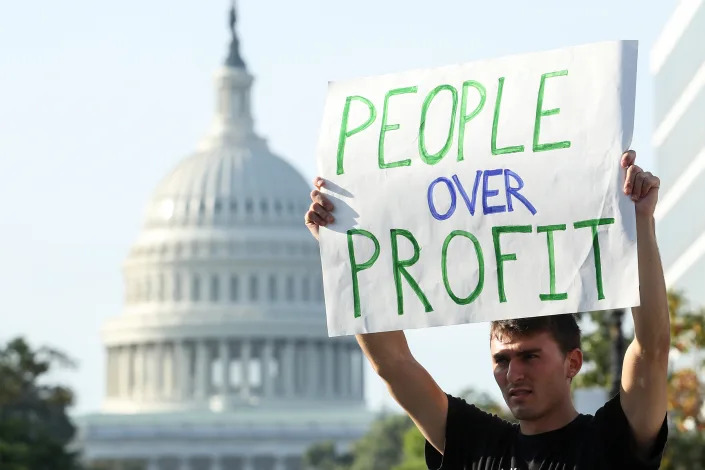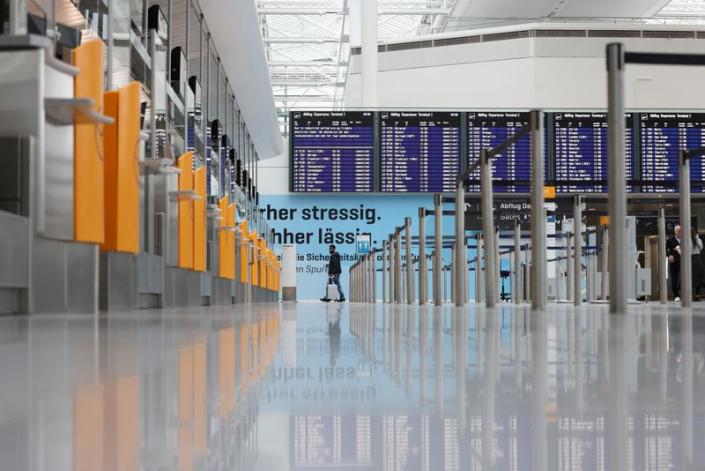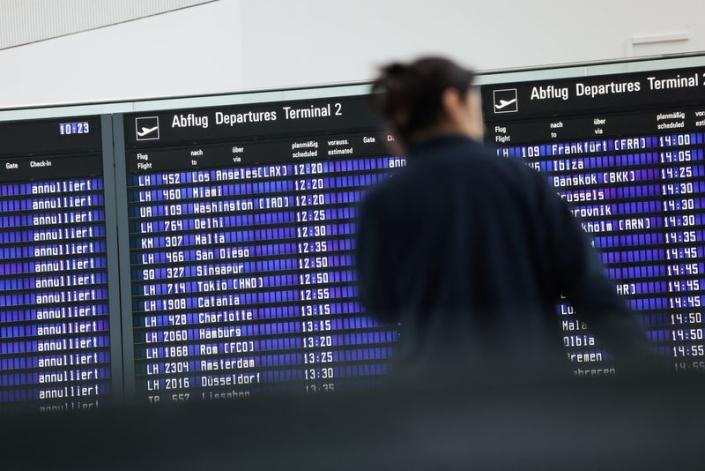
German Chancellor Angela Merkel, left, and Italian Prime Minister Matteo Renzi speak during a press conference in front of Michelangelo's "David statue" after their bilateral summit in Florence, Italy, on Jan. 23, 2015. The head of Florence’s Galleria del’Accademia on Sunday March 26, 2023 invited the parents and students of a Florida charter school to visit and see Michelangelo’s “David,” after the school principal was forced to resign following parental complaints that an image of the nude Renaissance masterpiece was shown to a sixth-grade art class.
(AP Photo/Antonio Calanni, File)
NICOLE WINFIELD and TERRY SPENCER
Sun, March 26, 2023
ROME (AP) — The Florence museum housing Michelangelo’s Renaissance masterpiece the David on Sunday invited parents and students from a Florida charter school to visit after complaints about a lesson featuring the statue forced the principal to resign.
Florence Mayor Dario Nardella also tweeted an invitation for the principal to visit so he can personally honor her. Confusing art with pornography was “ridiculous,” Nardella said.
The board of the Tallahassee Classical School pressured Principal Hope Carrasquilla to resign last week after an image of the David was shown to a sixth-grade art class. The school has a policy requiring parents to be notified in advance about “controversial” topics being taught.
The incredulous Italian response highlighted how the U.S. culture wars are often perceived in Europe, where despite a rise in right-wing sentiment and governance, the Renaissance and its masterpieces, even its naked ones, are generally free of controversy. Sunday's front page of the Italian daily publication Corriere della Sera featured a cartoon by its leading satirist depicting David with his genitals covered by an image of Uncle Sam and the word “Shame.”
Carrasquilla believes the board targeted her after three parents complained about a lesson including a photo of the David, a 5-meter tall (17 foot) nude marble sculpture dating from 1504. The work, reflecting the height of the Italian Renaissance, depicts the Biblical David going to fight Goliath armed only with his faith in God.
Carrasquilla has said two parents complained because they weren’t notified in advance that a nude would be shown, while a third called the iconic statue pornographic.
Carrasquilla said in a phone interview Sunday that she is “very honored” by the invitations to Italy and she may accept.
“I am totally, like, wow,” Carasquilla said. “I've been to Florence before and have seen the David up close and in person, but I would love to go and be a guest of the mayor.”
Cecilie Hollberg, director of the Galleria dell'Accademia, where the David resides, expressed astonishment at the controversy.
"To think that David could be pornographic means truly not understanding the contents of the Bible, not understanding Western culture and not understanding Renaissance art,” Hollberg said in a telephone interview.
She invited the principal, school board, parents and student body to view the “purity” of the statue.
Tallahassee Classical is a charter school. While it is taxpayer-funded and tuition-free, it operates almost entirely independently of the local school district and is sought out by parents seeking an alternative to the public school curriculum.
About 400 students from kindergarten through 12th grade attend the three-year-old institution, which is now on its third principal. It follows a curriculum designed by Hillsdale College, a conservative Christian school in Michigan frequently consulted by Florida Gov. Ron DeSantis on educational issues.
Barney Bishop, chairman of Tallahassee Classical's school board, has told reporters that while the photo of the statue played a part in Carrasquilla’s ouster, it wasn’t the only factor. He has declined to elaborate, while defending the decision.
"Parents are entitled to know anytime their child is being taught a controversial topic and picture,” Bishop said in an interview with Slate online magazine.
Several parents and teachers plan to protest Carrasquilla's exit at Monday night's school board meeting, but Carrasquilla said she isn't sure she would take the job back even if it were offered.
“There's been such controversy and such upheaval,” she said. “I would really have to consider, ‘Is this truly what is best?’”
Marla Stone, head of humanities studies at the American Academy in Rome, said the Florida incident was another episode in escalating U.S. culture wars and questioned how the statue could be considered so controversial as to warrant a prior warning.
“What we have here is a moral crusade against the body, sexuality, and gender expression and an ignorance of history,” Stone said in an email. “The incident is about fear, fear of beauty, of difference, and of the possibilities embedded in art.”
Michelangelo Buonarroti sculpted the David between 1501-1504 after being commissioned by the Cathedral of Florence. The statue is the showpiece of the Accademia, and helps draw 1.7 million visitors each year to the museum.
"It is incredibly sought-after by Americans who want to do selfies and enjoy the beauty of this statue,” Director Hollberg said.
The museum, like many in Europe, is free for student groups. There was no indication that any trip would be subsidized by the city or museum. ___
Spencer reported from Fort Lauderdale, Fla.
NICOLE WINFIELD and TERRY SPENCER
Sun, March 26, 2023
ROME (AP) — The Florence museum housing Michelangelo’s Renaissance masterpiece the David on Sunday invited parents and students from a Florida charter school to visit after complaints about a lesson featuring the statue forced the principal to resign.
Florence Mayor Dario Nardella also tweeted an invitation for the principal to visit so he can personally honor her. Confusing art with pornography was “ridiculous,” Nardella said.
The board of the Tallahassee Classical School pressured Principal Hope Carrasquilla to resign last week after an image of the David was shown to a sixth-grade art class. The school has a policy requiring parents to be notified in advance about “controversial” topics being taught.
The incredulous Italian response highlighted how the U.S. culture wars are often perceived in Europe, where despite a rise in right-wing sentiment and governance, the Renaissance and its masterpieces, even its naked ones, are generally free of controversy. Sunday's front page of the Italian daily publication Corriere della Sera featured a cartoon by its leading satirist depicting David with his genitals covered by an image of Uncle Sam and the word “Shame.”
Carrasquilla believes the board targeted her after three parents complained about a lesson including a photo of the David, a 5-meter tall (17 foot) nude marble sculpture dating from 1504. The work, reflecting the height of the Italian Renaissance, depicts the Biblical David going to fight Goliath armed only with his faith in God.
Carrasquilla has said two parents complained because they weren’t notified in advance that a nude would be shown, while a third called the iconic statue pornographic.
Carrasquilla said in a phone interview Sunday that she is “very honored” by the invitations to Italy and she may accept.
“I am totally, like, wow,” Carasquilla said. “I've been to Florence before and have seen the David up close and in person, but I would love to go and be a guest of the mayor.”
Cecilie Hollberg, director of the Galleria dell'Accademia, where the David resides, expressed astonishment at the controversy.
"To think that David could be pornographic means truly not understanding the contents of the Bible, not understanding Western culture and not understanding Renaissance art,” Hollberg said in a telephone interview.
She invited the principal, school board, parents and student body to view the “purity” of the statue.
Tallahassee Classical is a charter school. While it is taxpayer-funded and tuition-free, it operates almost entirely independently of the local school district and is sought out by parents seeking an alternative to the public school curriculum.
About 400 students from kindergarten through 12th grade attend the three-year-old institution, which is now on its third principal. It follows a curriculum designed by Hillsdale College, a conservative Christian school in Michigan frequently consulted by Florida Gov. Ron DeSantis on educational issues.
Barney Bishop, chairman of Tallahassee Classical's school board, has told reporters that while the photo of the statue played a part in Carrasquilla’s ouster, it wasn’t the only factor. He has declined to elaborate, while defending the decision.
"Parents are entitled to know anytime their child is being taught a controversial topic and picture,” Bishop said in an interview with Slate online magazine.
Several parents and teachers plan to protest Carrasquilla's exit at Monday night's school board meeting, but Carrasquilla said she isn't sure she would take the job back even if it were offered.
“There's been such controversy and such upheaval,” she said. “I would really have to consider, ‘Is this truly what is best?’”
Marla Stone, head of humanities studies at the American Academy in Rome, said the Florida incident was another episode in escalating U.S. culture wars and questioned how the statue could be considered so controversial as to warrant a prior warning.
“What we have here is a moral crusade against the body, sexuality, and gender expression and an ignorance of history,” Stone said in an email. “The incident is about fear, fear of beauty, of difference, and of the possibilities embedded in art.”
Michelangelo Buonarroti sculpted the David between 1501-1504 after being commissioned by the Cathedral of Florence. The statue is the showpiece of the Accademia, and helps draw 1.7 million visitors each year to the museum.
"It is incredibly sought-after by Americans who want to do selfies and enjoy the beauty of this statue,” Director Hollberg said.
The museum, like many in Europe, is free for student groups. There was no indication that any trip would be subsidized by the city or museum. ___
Spencer reported from Fort Lauderdale, Fla.












